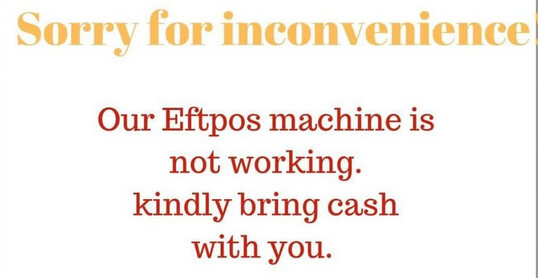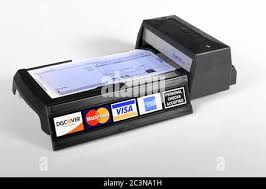Thanks Phil and Greg.
Apologies, I’m a bit late to the discussion. The denial of acceptance of cash might have been appropriate when the pandemic was raging, but, as has been since mentioned, the matter of determining what is a “contract” is probably a matter for the courts. I would find it hard to believe that a business would not accept cash if the internet, electricity (or both) failed.
But I found a more insidious reason for a business not to accept cash, especially in Canada and the United States. In 2019 before the pandemic, friends and I toured North America. The number of times that card payments obliged you to nominate a tip, especially in restaurants, was everywhere. You could not dismiss this obligation! Options were usually 15%, 20%, 25% or custom. On one occasion I paid cash and my change was returned, presumably I was supposed to make up the wages of the wait staff in addition to paying for what was a very ordinary culinary experience. My friend chose to nominate a custom tip of US$1 and was subsequently challenged by the manager: “How am I expected to pay the wages of my staff?” he shouted. Heads turned and we were asked to leave, which we gladly did. A nasty experience of the US financial culture which none of us needed.
Your story is all about tipping not about the disappearance of cash, the culture and history of tipping are quite different in Oz and the USA. Which is more appropriate is a topic for another day.
As you point out failing to comply with local rules causes problems with the locals. This happens, as in your examples, whether you pay by cash or not, so it really has nothing to do with the topic.
Thanks Syncretic, strictly speaking of course you are right, so apologies to you and any others who were offended by my off-topic reflections.
No apology required, we all do it sometimes.
Is there an assumption businesses will continue to support cash payments?
It’s counterintuitive for banks to encourage everyday consumer customers away from cash, while actively supporting cash services for businesses.
Most of our local businesses now offer cashless tap and pay as the first choice offered. Even for a single take-away coffee! It’s a sign that the banks may also be winning over even business. Customer preference plus banks changing how they will support business in the future.
How we choose to pay for our purchases will be the deciding factor?
While there’s still some cash transactions being made, businesses will be catered for by banks. When all payments will be made by electronic means, cash deposits/withdrawals by businesses will cease to exist as a consequence?
Should cash become unacceptable there are going to be many unhappy campers if the crew here are any guide. I suspect however that the demographics are quite skewed and do not represent the population at large.
With time the number who desire to carry the folding (and demand it handed over the counter personally) will decrease as the cohort who were adults before cards became ubiquitous cease worrying about it.
A local business posted this today. Why it is not working is not as important as it is not working, and stuff happens.

Yes and not. At some point as @syncretic suggests the generational demographics will align to ensure the cashless outcome. For our local demographic the balance may have already reached a tipping point. The big 4 plus Suncorp have already decided there is less to loose in walking away from business customers than the value of staying in any of the local townships. Clear disappointment expressed,
Glasshouse Country Chamber of Commerce president Jenny Broderick said that the move would upset a lot of business customers, especially after ANZ closed in February last year.
“There’ll be a significant upset from businesses in particular that made the move from ANZ to Comm Bank thinking that CBA would be around for an extended period of time,” Jenny said.
“For businesses banking money regularly, they will notice the effects the most.
Only the BOQ remains with a shop front, and promise, such as they are these days to stay for 10 years.
A further observation, for those keen to read the source news item is a suggestion internet banking is to be encouraged as a way forward and a way to overcome any disadvantage. The rub here is the variability of mobile coverage and less than excellent NBN services across the region.
When we rely on a product or on a service there’s always the question: What if it became temporarily unavailable?
What if there’s a power outage, or a problem with reticulated water, or the NBN is down ![]()
I’m sure that if cash became
obsolete some genius would come up with a back-up idea in case of an electronic failure, maybe taking our fingerprints or making use of our face biometrics to make sure we’d pay up in due time ![]()
![]()
Once upon a time before online everything remember credit cards were imprinted onto multi-copy paper dockets, and the dockets got deposited through the card companies, as well as sometimes being ‘adjusted’?
There is no limit to what is possible, but what is possible is irrelevant until one can hold it in one’s hand and use it reliably. Winding up cash until then, dreaming.
The heading of this topic is Apparitions of a cashless society…
It seems to me it means that something unusual and unexpected is in sight?
I think that’s what we’ve been reflecting on?
My personal dream is to have a choice of both cash and cashless systems operating well and at all times. To be realistic I see a cash society disappearing fast (to my disappointment because I’m in favour of choice)
Of course I have no Chrystal ball to predict the future. I hope I’ll be pleasantly surprised ![]()
I lost mine long ago. We can all share observations, in support of a point of view or to suggest a trend in progress.
In another discussion the retreat of the banks from providing over the counter and in person services is one cause for common concern. For this topic it is also a concern that the banks appear to be keen to remove themselves from also handing cash. It’s suggested the banks have no more interest in servicing business cash needs than those of consumers.
The small bakery and coffee shop I visit regularly and the F&V now expect cashless, are surprised by cash and covert payment in loose change. It’s an observation of one/two data points that as a business cashless has for what ever reasons become their most accepted norm.
The RBA has moved from speculation, while still holding onto a need for bank notes.
Summary from the RBA on the suggested pathway. Notes to continue, but no mention of how the RBA intends to support their distribution. For another day?
To conclude, I expect the shift to electronic payments will continue. The issues of functionality, security and reliability, and cost are central to the development of the system. The Payments System Board will be keeping a close eye on these issues.
While I have talked about a near cashless payments system, I want to emphasise that we don’t yet envisage a world without banknotes. The RBA is committed to providing cash consistent with demand by users and to support its distribution. Our development of the Next Generation Banknote series is a clear commitment to ensuring that cash continues to have public confidence and to meet the needs of the community.
I’m sorry but I don’t remember those, I came in when plastic cards were in use. Covid19 was the catalyst for me to start using my card for all purchases. I put away my unhygienic, heavy, coin purse and now ‘tap and pay’ for everything. However, I very often see plastic cards being superseded by a digital wallet at the POS ![]()
The key word here is ‘Demand’, how long cash money will be in use will depend on that, and for the sake of those who prefer it, I hope it’ll be a long time ![]()
No, credit cards were plastic cards but they were not electronic, no magnetic strip and certainly no chip. Maybe @PhilT can find you a photo on the internet.
I remember these.

I remember when the electronic machine failed you could rely on the business to still have one of those devices under the counter with the paper and carbon as a backup if the new-fangled stuff didn’t work …
Ask Connie.Booth? Being superseded 3 times is just how things go these days. Or is it updated? ![]()
Me thinks you confuse Peter Sellers with John Cleese.
![]()
